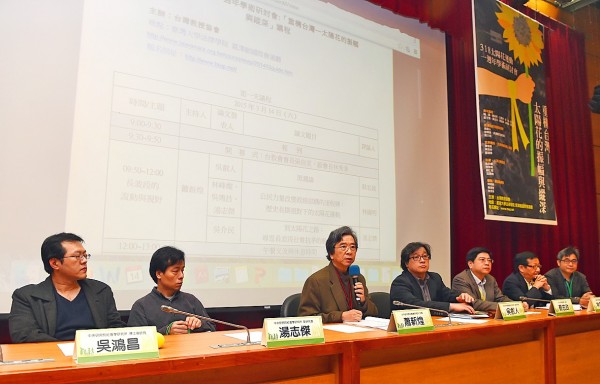《TAIPEI TIMES 焦點》 Sunflower movement ‘not accidental’

Academia Sinica Institute of Sociology director Michael Hsiao addresses a forum organized by the Taiwan Association of University Professors in Taipei yesterday marking the first anniversary of the Sunflower movement. Photo: Chien Jung-fong, Taipei Times
SOCIAL PHENOMENON: Academics discussed the historical context and impact of the student-led protest on Taiwanese politics, society and culture at a Taipei forum
By Alison Hsiao / Staff reporter
The birth of the Sunflower movement might have been unexpected, but its emergence as a demonstration of civic power in the face of Taiwanese capitalists’ colluding with a rising China was not accidental, academics said yesterday at a forum in Taipei.
Days before the first anniversary of the Sunflower movement — the civil protest that broke out in March last year in opposition to the Chinese Nationalist Party (KMT)-dominated legislature’s ramming through a controversial cross-strait service trade agreement — academics gathered to discuss its impact on Taiwanese politics, society and culture.
Participants included sociology and history researchers who placed the Sunflower movement in a larger geopolitical setting and a longer timeframe, saying it was the culmination of past movements and called for a rethinking of Taiwan’s nationhood, its relationship to China, and its reaction to and suspicion of the so-called China factor.
Academia Sinica’s Institute of Taiwan History associate research fellow Wu Rwei-ren (吳叡人), who has been studying the history of Taiwanese political thought and the theoretical foundation for civic nationalism, said that the 318 movement — as the Sunflower movement is also known — signifies a “leftist turn” of the social base of Taiwanese nationalism.
“Contemporary Taiwan has emerged after wading through different periods of capitalism/imperialism — from the classic imperialism of the Japanese colonial period, through the US’ informal empire during the Cold War and the neoliberal US hegemony in the post-Cold War period, to the latest new imperialism of a rising China,” Wu said.
Different from the earlier democratization period in which nation-building was based on forming strong ties with capital owners, the 318 generation, struggling in a world where China engages in “free trade imperialism” and with Taiwan’s capital turning into “comprador capital,” has come to define the question “Who are Taiwanese?” with the 1-percent-versus-99-percent distinction, Wu said.
Wu Hung-chang (吳鴻昌), a postdoctoral researcher at Academia Sinica’s Institute of Sociology, said the Sunflower movement should be viewed in the fabric of a post-Cold War world.
Taiwan’s status has been changing — from being considered an “unsinkable aircraft carrier” against communist China to a precarious state in a world where the US first befriended China, but now regards it as a potential rival, he said.
“The Sunflower movement can be seen as a statement for correctly positioning Taiwan: that Taiwanese will not be fooled by the attempts [of the Chinese Communist Party and the KMT] to label the cross-strait relationship with ‘Chinese Civil War’ rhetoric,” he said. “The movement has also demonstrated that Taiwanese youth are not persuaded by China’s ‘great nation’ framework.”
Academia Sinica’s Institute of Sociology associate research fellow Wu Jieh-min (吳介民) put the movement in the context of a shorter timeframe, saying that resistance against the “China factor” had been building up since 2008, when the visit of then-Association for Relations Across the Taiwan Straits chairman Chen Yunlin (陳雲林) sparked accusations of police brutality, a phenomenon that had not been seen in the country for at least 20 years.
It was followed in 2009 by the government’s rejection of exiled Uighur leader Rebiya Kadeer’s application to visit Taiwan, and in 2012 by the protests against media monopolization, which also carried elements of Chinese influence, as China Times Group chairman Tsai Eng-meng (蔡衍明) is “unabashedly pro-Beijing,” Wu Jieh-min said.
The social movement against the “China factor” has been a “long-wave” one, as Beijing’s highly modern politico-economic statecraft, which takes the form of a commercial mode to bargain for political fidelity and is exactly what the “China factor” is about, has been making and continues to find its way into the nation, he said.
While the Chinese government has tried to appear unconcerned about the movement and called the result of the nine-in-one elections last year “a glitch,” Chinese President Xi Jinping’s (習近平) recent mention of the so-called “1992 consensus” betrayed the shock it felt,” he said.
“The consensus had not been mentioned by the Chinese supreme leader for some time. Beijing has always tried to turn the screw on Taiwan by pushing forward from the consensus to a solid ‘one China’ framework. Moving back to the consensus is an adjustment made on the part of Beijing,” he said.
新聞來源:TAIPEI TIMES
















